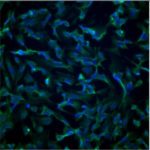Link to Pubmed [PMID] – 30605689
Cell Rep 2019 Jan;26(1):94-107.e7
Despite the clinical success of blocking inhibitory immune checkpoint receptors such as programmed cell death-1 (PD-1) in cancer, the mechanisms controlling the expression of these receptors have not been fully elucidated. Here, we identify a post-transcriptional mechanism regulating PD-1 expression in T cells. Upon activation, the PDCD1 mRNA and ribonucleoprotein complexes coalesce into stress granules that require microtubules and the kinesin 1 molecular motor to proceed to translation. Hence, PD-1 expression is highly sensitive to microtubule or stress granule inhibitors targeting this pathway. Evidence from healthy donors and cancer patients reveals a common regulation for the translation of CTLA4, LAG3, TIM3, TIGIT, and BTLA but not of the stimulatory co-receptors OX40, GITR, and 4-1BB mRNAs. In patients, disproportionality analysis of immune-related adverse events for currently used microtubule drugs unveils a significantly higher risk of autoimmunity. Our findings reveal a fundamental mechanism of immunoregulation with great importance in cancer immunotherapy.

